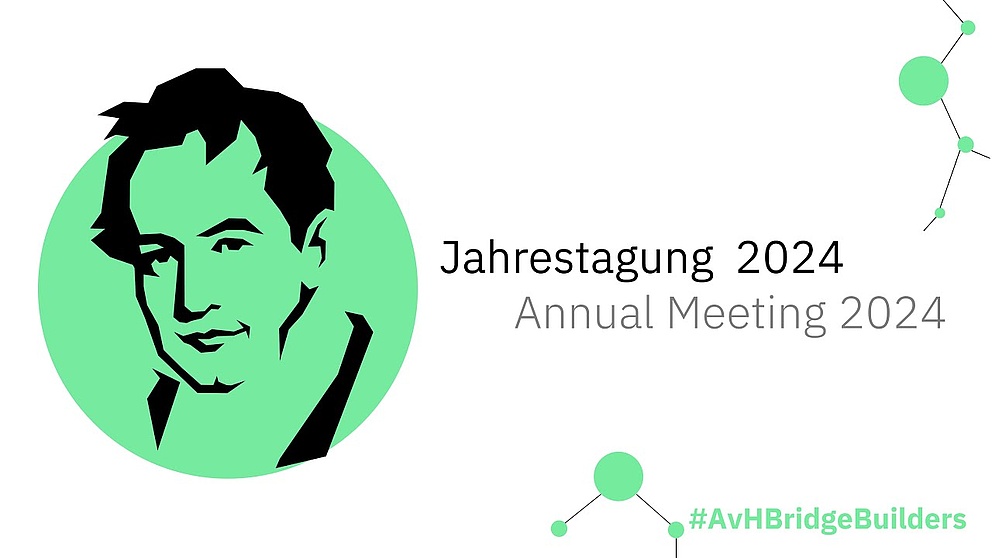
Contact
Press, Communications and Marketing
Tel.: +49 228 833-144
Fax: +49 228 833-441
presse[at]avh.de
Participants will come from across the globe, from countries that include India, China, the USA, Benin, Mexico and Australia. In all, 565 scientists and scholars from 70 countries, who are currently guests at a German university thanks to assistance from the Humboldt Foundation, are expected to attend. Many will be coming with their families. The aim behind the Humboldt Foundation’s Annual Meetings is to provide a setting where Humboldtians can get acquainted and share information and ideas with one another.
The Annual Meeting at STATION Berlin will be opened on 27 June by Robert Schlögl, President of the Humboldt Foundation. The welcome address will be given by Katja Keul, Minister of State in Germany’s Federal Foreign Office. The keynote address on the subject “What is a physicist doing in biology and medicine?” will be given by Jochen Guck, Professor at FAU Erlangen-Nürnberg and Director at the Max Planck Institute for the Science of Light. Originally a physicist, Jochen Guck conducts research along the interface between biology and biomedicine, with a focus on the mechanical properties of cells and tissues. He had moved to Germany from the UK in 2012 to take up a Humboldt Professorship at TU Dresden.
Following his address, Humboldtians from Brazil and Australia will report on their experiences during their research stays in Germany in a discussion with Thomas Hesse, interim Secretary General of the Humboldt Foundation. The afternoon will be dedicated to lectures and laboratory and campus tours at Technische Universität Berlin.
Germany’s President Frank-Walter Steinmeier is inviting Humboldtians to attend a reception being held in the park at Schloss Bellevue on 28 June. Before the reception begins, he will present the Philipp Franz von Siebold-Preis 2024 to Naoki Yoshida, professor at the Kavli Institute for the Physics and Mathematics of the Universe at the University of Tokyo for his outstanding scientific work and his outstanding contributions to fostering exchange between Germany and Japan.
During the entire Annual Meeting, the researchers will be available for interviews about, for example, living and conducting research in Germany and their country of origin, and about their own research projects. Journalists are cordially invited to attend both days. It is permitted to film, photograph and make audio recordings during the activities. We will be glad to arrange interviews.
Please apply for accreditation by 12 noon on Wednesday, 26 June 2024, at the latest, by sending an e-mail with the following information:
- Programme activity you would like to attend
- Contact information
- Name of media organisation
- Copy of your press ID
For journalists without an accreditation card of the Federal Press Office: If you would like to attend the reception being hosted by the German president for Humboldtians in the park at Schloss Bellevue, please also indicate your date and place of birth. Please additionally bring a valid ID (passport or government-issued identity card) and press card with you to the event.
Programme
Opening ceremony for the annual meeting with keynote address by Humboldt Professor Jochen Guck
Time: Thursday, 27 June 2024, 10:00 a.m.
Venue: STATION Berlin, Luckenwalder Str. 4-6, 10963 Berlin
Livestream: www.humboldt-foundation.de/annual-meeting-2024
Humboldt Lunchtime Fair
Time: Thursday, 27 June 2024, 12 noon to 4:00 p.m.
Venue: STATION Berlin, Luckenwalder Str. 4-6, 10963 Berlin
Reception being given by Germany’s Federal President for Humboldtians
Time: Friday, 28 June 2024, 10:15 a.m. (admission until 10:00 a.m.)
Venue: Park at Schloss Bellevue, Spreeweg 1, 10557 Berlin
Contact on location on 27 und 28 June:
Lisa Purzitza, Tel. 0151 28403211
Stefan Wünsche, Tel. 0160 93630677
(Press release 12/2024)
Every year, the Alexander von Humboldt Foundation enables more than 2,000 researchers from all over the world to spend time conducting research in Germany. The Foundation maintains an interdisciplinary network of well over 30,000 Humboldtians in more than 140 countries around the world – including 63 Nobel Prize winners.

